

Shsaplit - Rime of the Ancient Mariner and Frankenstein. Day after day, day after day, We stuck, nor breath nor motion; As idle as a painted ship Upon a painted ocean.
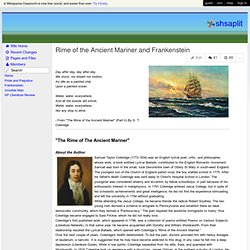
The Rime of the Ancient Mariner. The Rime of the Ancient Mariner is a poem by Samuel Taylor Coleridge (1772-1834).
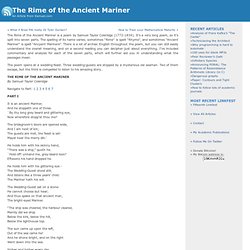
It’s a very long poem, so it’s split into seven parts. The spelling of its name varies; sometimes “Rime” is spelt “Rhyme”, and sometimes “Ancient Mariner” is spelt “Ancyent Marinere”. There is a lot of archaic English throughout the poem, but you can still easily understand the overall meaning, and on a second reading you can decipher just about everything. I’ve included commentary and analysis for each of the seven parts, which will further aid you in understanding what the passages mean. The poem opens at a wedding-feast. THE RIME OF THE ANCIENT MARINERBy Samuel Taylor Coleridge Navigate to Part: 1 2 3 4 5 6 7 It is an ancient Mariner, And he stoppeth one of three. The bridegroom’s doors are opened wide, And I am next of kin; The guests are met, the feast is set: Mayst hear the merry din.’ He holds him with his skinny hand, “There was a ship,” quoth he.
Navigate to Part: 1 2 3 4 5 6 7. The Kubla Khan Poem. One of my favorite poems is the Kubla Khan of Samuel Taylor Coleridge (the same poet who penned The Rime of the Ancient Mariner, previously featured on this site).
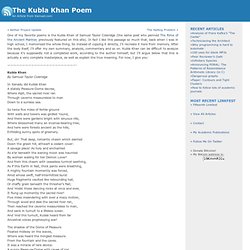
In fact I like this passage so much that, back when I was in high school, I memorized the whole thing. So instead of copying it directly, I’ll recreate it here from memory. After the body itself, I’ll offer my own summary, analysis, commentary and so on. Kubla Khan can be difficult to analyze because it’s supposedly not a completed work, according to the author himself; but I’ll argue below that this is actually a very complete masterpiece, as well as explain the true meaning. For now, I give you: Kubla KhanBy Samuel Taylor Coleridge In Xanadu did Kublai Khan A stately Pleasure-Dome decree, Where Alph, the sacred river ran Through caverns measureless to man Down to a sunless sea. But, oh! Kubla Khan and Dirk Gently’s Holistic Detective Agency. As you know, I’m a big fan of the poet Samuel Taylor Coleridge, especially his epic poems Kubla Khan and The Rime of the Ancient Mariner.
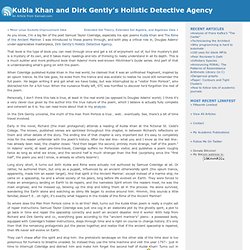
I was introduced to these poems through, and both play a critical role in, Douglas Adams’ under-appreciated masterpiece, Dirk Gently’s Holistic Detective Agency That book is the type of book you can read through once and get a lot of enjoyment out of, but the mystery’s plot is a mystery of its own, and it takes many readings and lots of thinking to really understand in all its depth. This is a much subtler and more profound book than Adams’ more well-known Hitchhiker’s Guide series. And part of that is understanding what’s going on with the poem.
When Coleridge published Kublai Khan in the real world, he claimed that it was an unfinished fragment, inspired by an opium trance. Personally, I don’t think this tale is true, at least in the real world (as opposed to Douglas Adams’ world). So where does the Man from Porlock come in to all this? The Waste Land. "The Waste Land", by T.S.
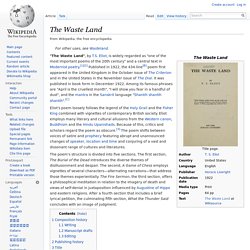
Eliot, is widely regarded as "one of the most important poems of the 20th century" and a central text in Modernist poetry.[1][2] Published in 1922, the 434-line[B] poem first appeared in the United Kingdom in the October issue of The Criterion and in the United States in the November issue of The Dial. It was published in book form in December 1922. Among its famous phrases are "April is the cruellest month", "I will show you fear in a handful of dust", and the mantra in the Sanskrit language "Shantih shantih shantih". [C] The poem's structure is divided into five sections. Composition history[edit] Writing[edit] Richard Aldington, in his memoirs, relates that "a year or so" before Eliot read him the manuscript draft of The Waste Land in London, Eliot visited him in the country.[5] While walking through a graveyard, they discussed Thomas Gray's Elegy Written in a Country Churchyard.
Manuscript drafts[edit] Editing[edit] Eliot, T. S. 1922. The Waste Land. In Flanders Fields. Inscription of the complete poem in a bronze "book" at the John McCrae memorial at his birthplace in Guelph, Ontario, Canada.
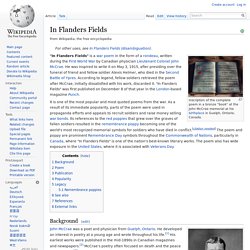
Background[edit] Lieutenant Colonel John McCrae was a soldier, physician and poet. John McCrae was a poet and physician from Guelph, Ontario. He developed an interest in poetry at a young age and wrote throughout his life.[1] His earliest works were published in the mid-1890s in Canadian magazines and newspapers.[2] McCrae's poetry often focused on death and the peace that followed.[3] Watch Between the Lines: The Beatles.